Back in January a sad piece of news flew under most people’s radar. The actor Julian Sands was missing. He’d been climbing California’s Mt Baldy at the onset of what would, unbeknownst to him, become a record breaking winter for snowfall.
Sands had a deep and personal respect for mountains. In an interview just last year for a conference of Percy Shelley scholars, he described Shelley’s Mont Blanc: Lines Written in the Vale of Chamouni as one of his favourite poems for its evocation of the power of the mountain.
Winter in the mountains is always a tough season for rescuers as operations tend to bring more bad news than good. Sands knew very well what he was doing. He was experienced, and he did not take nature’s proclivity toward wrath for granted. Nevertheless, on January 13th, 2023 he fell silent somewhere close to Baldy’s summit. A search was undertaken that lasted only a couple of weeks before it needed to be abandoned due to harsh conditions.
When I started writing this feature about Julian his Wikipedia page still referred to him in the present tense, though he’d been presumed gone since February. It was coincidence that I’d scheduled this to run the week that they ultimately found him.
The effort to find Julian didn’t create anywhere near the media frenzy of five guys in a submarine. He wasn’t exactly the face of Hollywood. News reports of his disappearance often referred to him as “The Room With a View actor,” referring to his most mainstream leading role alongside Daniel Day-Lewis nearly 40 years ago. It is probably the only film he was in that most casual moviegoers would recognise the title of.
I’ve still never seen A Room With a View. But I did really like Julian Sands. He just kept popping up in movies I liked to watch in my youth. Namely, horror movies. He wasn’t a horror icon on the scale of, say, Lance Henriksen, but he did have a presence. He was soft spoken, a handsome Brit with an acting style that reminds me of David Thewlis. To give him a celebration he rarely gets in the media I decided to re-watch a few of his horror movies—and also watch a couple I hadn’t seen before.
WARLOCK
I used to always get Warlock mixed up with Wishmaster, and I suspect the latter was heavily influenced by the former even though it came nearly a decade later. Both involve a spell-casting villain from centuries ago time-traveling to what was then the modern day in the late 20th century.
Watching this again I was surprised just how well it holds up. Warlock was released in 1989, so it’s much younger than even Ghostbusters, but does a great job on a lower budget.
And it’s one of Sands’ best performances just by virtue of how much fun he’s clearly having.
There’s some Terminator influence in the story. Sands’ titular unnamed warlock lives in a version of pilgrim era America that’s almost Python-esque with nooses hanging from poles and townsfolk shoving cats into wicker baskets.
Awaiting execution for witchcraft, he’s saved by a demon named Samael who zaps him forward in time to the 1980s so that he can find a book that contains God’s real name, which, if read backwards, will undo creation. It’s unclear why the warlock has to travel to the 80s to find this book, which already also exists in his own time, and it’s unclear what the warlock gets out of this deal that will destroy the universe including himself, but presumably there’s some kind of promised reward in eternity. Also a mystery: Why the demon also teleports the witch hunter played by Richard E. Grant, the one man who knows how to stop him. Maybe he just thinks it’s all a bit of light entertainment.
The warlock is cartoon evil—just bad because he enjoys it. But this was the formula for this kind of film in the 80s. It’s not really a slasher like its Elm Street/Friday the 13th contemporaries. Murdering people isn’t the end in itself for the villain. But it does play to the formula of the supernatural villain being the centrepiece of the movie and its most enjoyable character.
What’s kind of interesting about this movie is that (and this is probably more evidence of inspiration from Terminator) Richard E. Grant’s monster hunter character, who you expect to be the primary hero, is quickly overshadowed and upstaged at his own game by the female lead, waitress Kassandra, played by Lori Singer of Footloose fame, who vanquishes the warlock while calling him a “fuckbrain.”
GOTHIC
This is a faux historical account of a real dinner party that took place in 1816 where a bunch of upper crust aristocratic writers got together, did a shitload of drugs, and came up with several of the foundational works of horror literature all at the same time. The party—which did really take place—was hosted by Lord Byron, and attended by Percy and Mary Shelley, Claire Clairmont, and John Polidori, the author of The Vampyre (which in turn inspired Dracula).
Fittingly for the subject matter, director Ken Russel winds up putting a monster in the mansion and envisioning the event itself as a horror story.
Julian Sands here plays Percy Shelley in a role that probably ties with Boxing Helena as his most over-the-top performance, which stands in complete contrast to his extremely stoic role in Warlock. I don’t know enough about the writer of Ozymandias to speak to the accuracy of his portrayal, but I do know that Sands did his research.
The historical accuracy isn’t really so important though when you’re talking about the version of the story in which someone’s nipples turn into eyes.
Sands’ Shelley plays a foil to the very smouldering and serious Lord Byron, played by Gabriel Byrne, who manages to look very bored while getting head during an orgy.
Gothic isn’t a hugely eventful movie until the final act, which is fine for a slow burn of a film that’s mostly about a bunch of rich bisexual libertines telling stories, doing opium, and boning in front of each other. It’s more notable for being visually very stunning, with entire scenes that recreate baroque art and bring it to life.
ARACHNOPHOBIA
Frank Marshall is a legendary name in Hollywood as a producer, being the man behind Amblin and most of Spielberg’s classic work. Lesser known is the fact that he directed a few movies and most of them are fairly bad. One of them is 1990’s Arachnophobia.
I suffer very badly from arachnophobia myself but, mercifully and perhaps unusually, I’m not much bothered by spiders in pictures or movies. I can’t get ten metres of one in real life without freezing up, though, and if one got on me, I don’t know, I’d probably actually just die. Like my whole ghost would just say “nope, sorry,” and fly out of my body like steam escaping a kettle.
Spiders in movies aren’t nothing to me, though, it’s probably why I got most of the way through my life without realising Arachnophobia is supposed to be a comedy. Like spiders are a silly thing to be afraid of and it’s cute and funny when people think they’re scary. I guess the John Goodman character should have tipped me off.
Sands plays a biologist, one of the world’s foremost spider experts (arachnologist??), who gets very upset when people talk smack about spiders and takes the opportunity to set the record straight by rattling off interesting spider facts.
He inadvertently brings a new species of deadly spider back to America from the Venezuelan jungle, where it winds up crawling into a small town in California where big city doctor Jeff Daniels lives. He is scared of spiders. Thus establishing the central conflict of the film.
Of all the films I rewatched here, this is the one in which Julian Sands does the least interesting stuff, as his character is mostly used as a frame around what is essentially a slasher movie with a regular spider as the villain and one of the guys from Dumb and Dumber as the hero. But this was the first movie I ever saw with him in it, and being that fear of spiders was kind of my thing, I watched this movie a lot as a kid. It was one of my first introductions to the horror genre as a whole, and the primary reason I developed such an affection for Julian Sands. Seeing him get chomped by a spider and hung upside down was something I now realise was supposed to be funny, but as a kid it was something that I was positive could really happen to me.
BOXING HELENA
You can’t find Boxing Helena even when you’re looking for it. I’d never seen it before this but I knew I wanted to. But it’s not streaming anywhere in Australia and imports start at $50 for DVD or $80 if I prefer for some reason, VHS. Maybe for that authentic 1993 viewing experience, who knows? I wound up managing to see it through means that aren’t strictly legal.
Boy is this one of the weirdest movies I’ve ever seen in terms of premise and execution. At first glance it’s just a gender-swapped Misery—Julian Sands plays an obsessed fan who saves the object of his affection, Helena, from a life threatening accident but then won’t let her leave. The difference is that Boxing Helena is a very disturbingly sexual movie and I can’t figure out whether I find it misogynistic or just the opposite.
See, Sands’ character is a brilliant surgeon but also basically what we could now call an “incel.” As the movie progresses and he’s frustrated by Helena’s attempts to escape or harm him, he responds by progressively amputating her limbs. And you’d be forgiven for thinking that’s an absolutely grotesque chauvinistic abuse fantasy, but Helena is actually a very powerful female character. Her strength and sexual independence are never portrayed as something she deserves to be punished for. To the contrary, Sands’ character is mewling and pathetic, as she reminds him constantly.
Reading up on this after the fact, it turns out that this movie has an interesting production history. It was initially embroiled in what the film industry lovingly calls “development hell,” and originally pegged to be a much more mainstream and prominent production, with Madonna in talks to play Helena. The role eventually went to Kim Basinger, who was initially fascinated by the story because of how completely batshit insane it was, but after her attachment to the film drove up hype, she got cold feet—because, well, of how batshit insane it was. After she dropped out and they had to find a much less famous actress to fill the role, the film bombed, and the film company blamed Basinger. Instead of, you know, the batshit.
Sands is almost completely unbearable in this movie which, I suppose, is deliberate. And given that it takes to a logical conclusion an abusive power fantasy that you see all too often on the internet in the 21st Century, it takes on a kind of black satirical reading that I don’t think was quite intended originally. One might imagine Julian in a fedora.
ROSE RED
Rose Red is a Stephen King telemovie. Keeping with the unspoken but nevertheless unabating mandate that all Stephen King’s stories are to be eventually made into movies, there was a time during the 90s to early 2000s when whichever books were unfilmable as features for whatever reason were dumped onto TV as a miniseries. And we’re talking about what the word “television” used to mean before streaming, which was free to air commercial television. These films weren’t like Marvel’s Secret Invasion—they were filmed around the placement of commercial breaks and had the budget and general cinematographic feel of Days of our Lives.
What makes Rose Red different is that it wasn’t an adaptation of any of King’s novels. He wrote it initially as an adaptation of Shirley Jackson’s The Haunting of Hill House, but during development they wound up throwing out King’s script (which seems like a weird decision to me, but I’m not the King of DreamWorks so what the hell do I know) and hired someone else instead, resulting in the 1999 adaptation with Liam Neeson and Catherine Zeta Jones. King wound up re-writing the script just enough that he could film it with a different title, but still what you basically have here is a Haunting of Hill House adaptation with Stephen King stock characters.
By which I mean, if you’re familiar with Stephen King then you’ve seen these characters before. I have a very great admiration for King, but he does tend to reuse characters, and in an effort to make this story different enough from Shirley Jackson’s novel to avoid the lawyers knocking, he’s pulled a bunch of them out of the grab-bag, including the naïve but well-meaning and doddering old man, the revolting nerd who doesn’t deserve as much hate as all the other characters seem to think he does, and of course the obligatory-to-mandatory psychic child.
Julian Sands plays another one of these stock King characters, which is the calm, very level-headed and handsome man who quickly though hesitantly finds himself elected leader. It’s he who thinks it’s a bad idea to enter an evil supernatural house with the intention of making it angry, but also knows pretty much what to do when they do that.
Though it’s a pretty forgettable movie, I wanted to mention it because it’s the only time I’ve seen Sands play an unambiguously good character, a role he accomplishes with a great deal of confidence, probably because he’s playing a role that’s pretty close to just being himself.
Stephen King movies always have the same fail point when they attempt to be faithful—for some reason I can’t pinpoint, King’s dialogue reads very naturally on the page but sounds fake and stilted as hell when spoken aloud. It’s really only Sands and the puzzlingly-miscast-but-capable Nancy Travis who avoid speaking their lines like they’re reading off a teleprompter. Still, it’s decent enough for television.
THE GHOSTS OF MONDAY
Julian Sands’ last horror movie is the direct-to-video The Ghosts of Monday, which is unfortunately not the kind of quality film befitting the punctuation mark at the end of his career. But that has nothing to do with him. I actually think this is one of his best performances, and he absolutely acts circles around every other person in this movie.
Mark Huberman, primarily known for TV roles, very angrily plays a filmmaker who is hired to direct a kind of ghost hunting television series, and he and his crew agree to film the pilot at a notorious haunted hotel. He’s serious about the ghost stuff, which is why he’s super extra furious to learn that the host of the show, played by Sands, is a hack fraud who fakes ghosts with special effects.
I was pretty bemused by Huberman’s style of acting, which was strange for the leading man—he looks and sounds so completely pissed off all of the time, even when he’s trying to be romantic or sad.
The acting notwithstanding, this isn’t a terrible movie. It actually feels like a Dario Argento film at times. It keeps you guessing about what kind of horror movie it’s going to wind up being—you start off expecting a haunted hotel, but then it takes a turn into slasher territory before teasing that it’s actually a creature feature.
Though it has the budgetary feel of one of those filler movies that comes bundled with an Amazon Prime membership, it’s a pretty decent chiller. And, satisfyingly, to bookend this movie marathon, it’s the best job I’ve seen Julian Sands do with a horror role since Warlock.
That, I think, elevates it way beyond the easily dismissed straight-to-DVD forgotten film that it otherwise would have been. It’s the last time we’ll see Julian on film—happy, and doing a fucking great job.























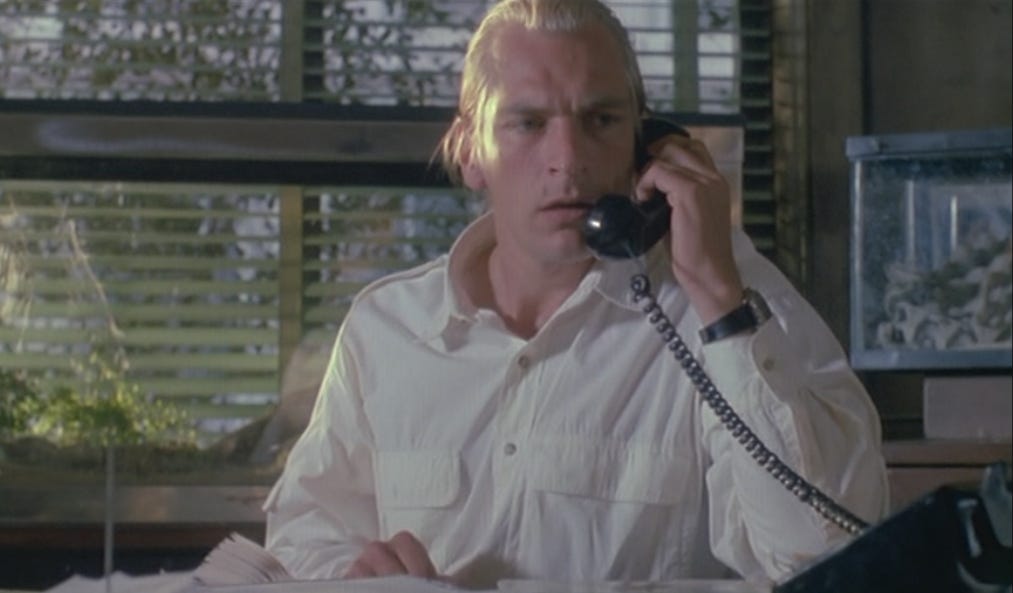






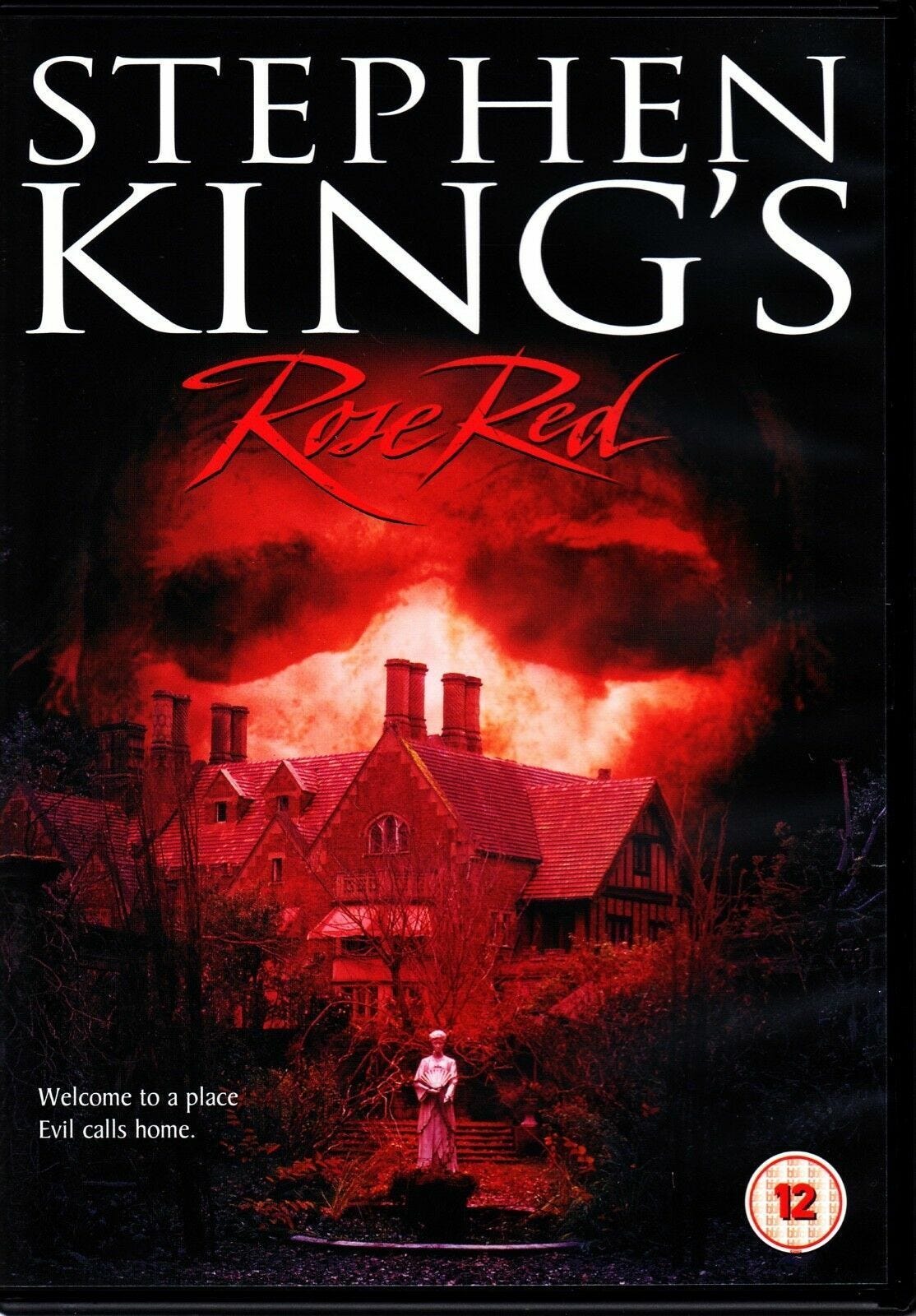




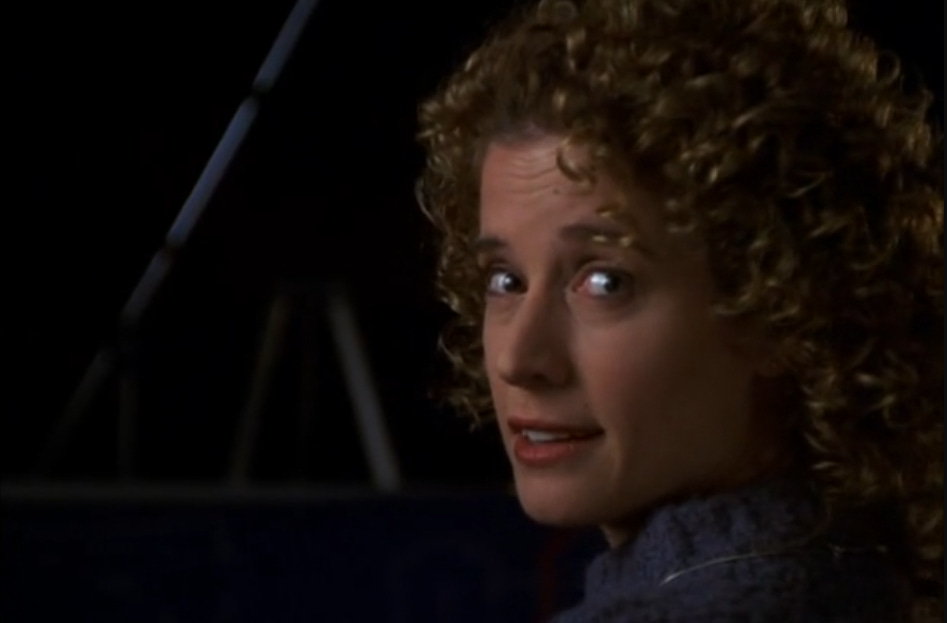


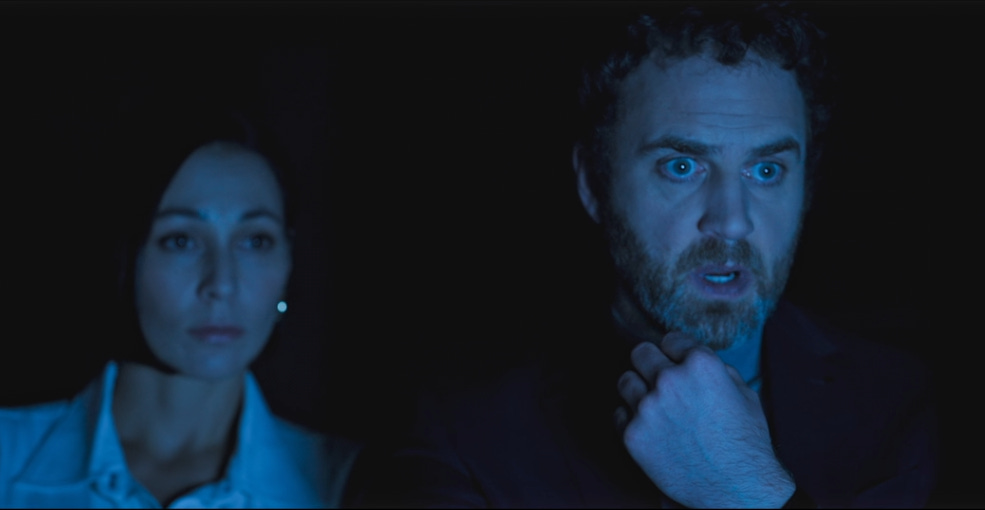




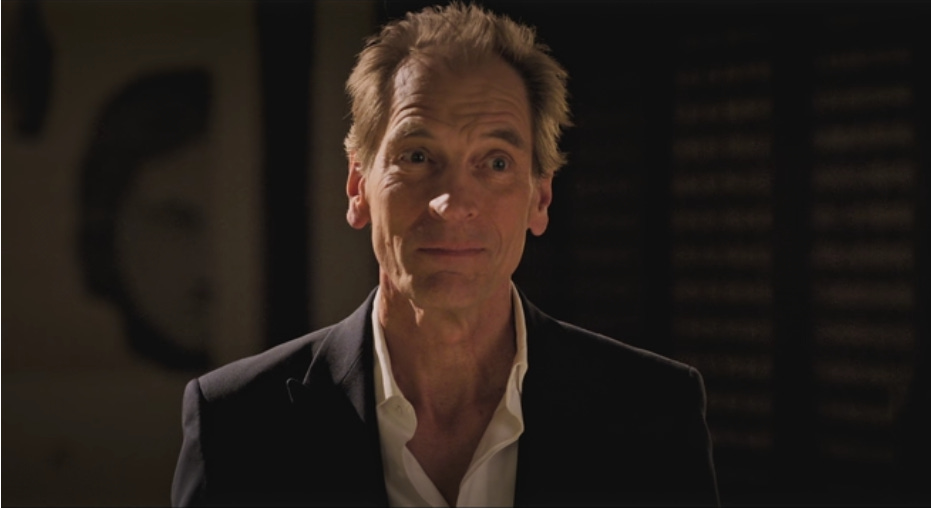

Being from Southern California myself, I was keenly aware of the long odds against Sands when news came about his disappearance. The fact that he went missing just days before a record-breaking storm, in a year when we had a record-breaking winter, it all gave me a sense of foreboding. Like Sands, I know these mountains, and for him to knowingly venture off into the wild, when and where he did, I had hoped that it meant that he was properly prepared for extreme conditions. Any experienced outdoorsman can tell you that there are no guarantees in the backcountry. Mallory died just below the summit on Everest. Scott and his team perished 20 kilometers from the supply depot. Grissom, White, and Chaffee all had the right stuff and still perished in a training accident.
Even the most experienced can still fall victim to the sublime power of forces greater than us. It's part of what makes us human. Our healthiest reaction is to remember what we can about someone we recall with fondness. May Sand's family be comforted in their grief.
I was so sorry to hear of Julian Sands death.
I have such vivid memories of watching Warlock when I was young; I loved the part with his footprints being nailed down.
And even though Arachnophobia isn't a great movie, I loved it, mostly because of Julian.
He will be missed, thank you for this interesting tribute.